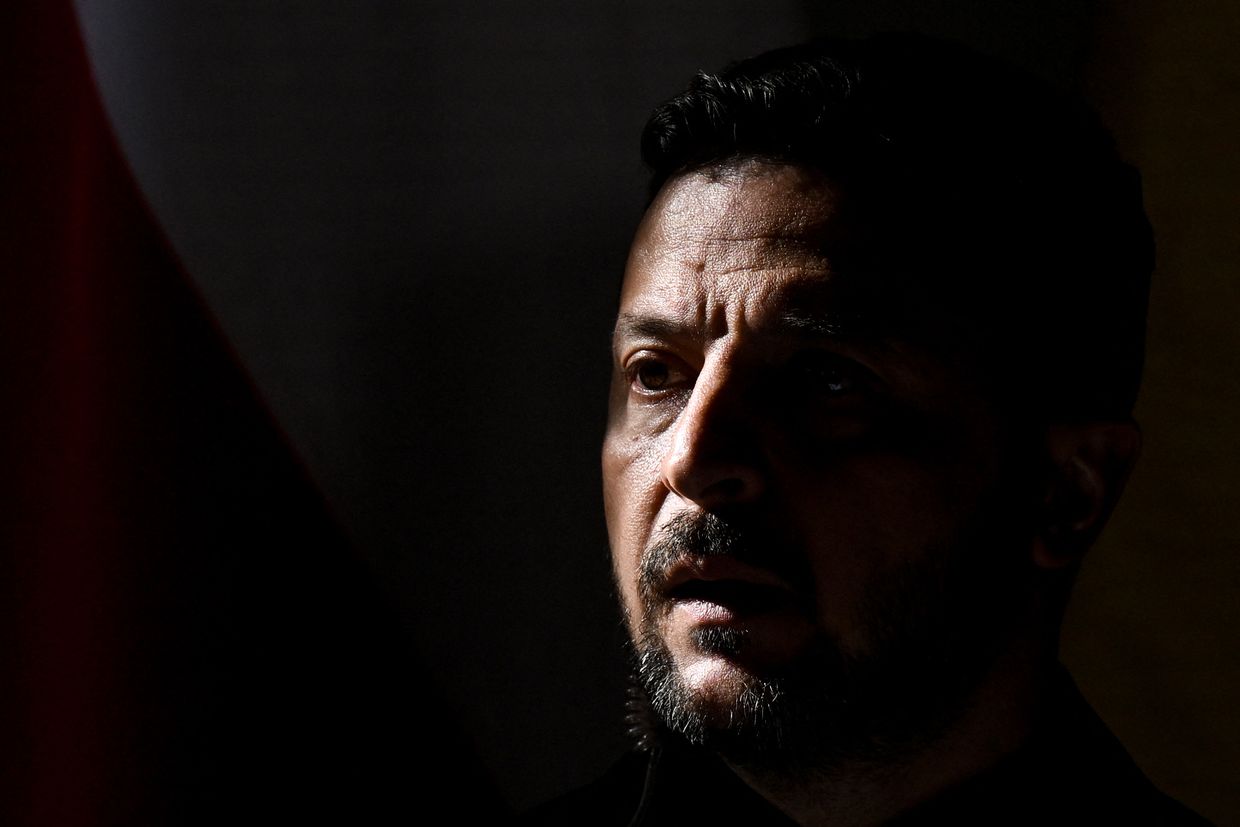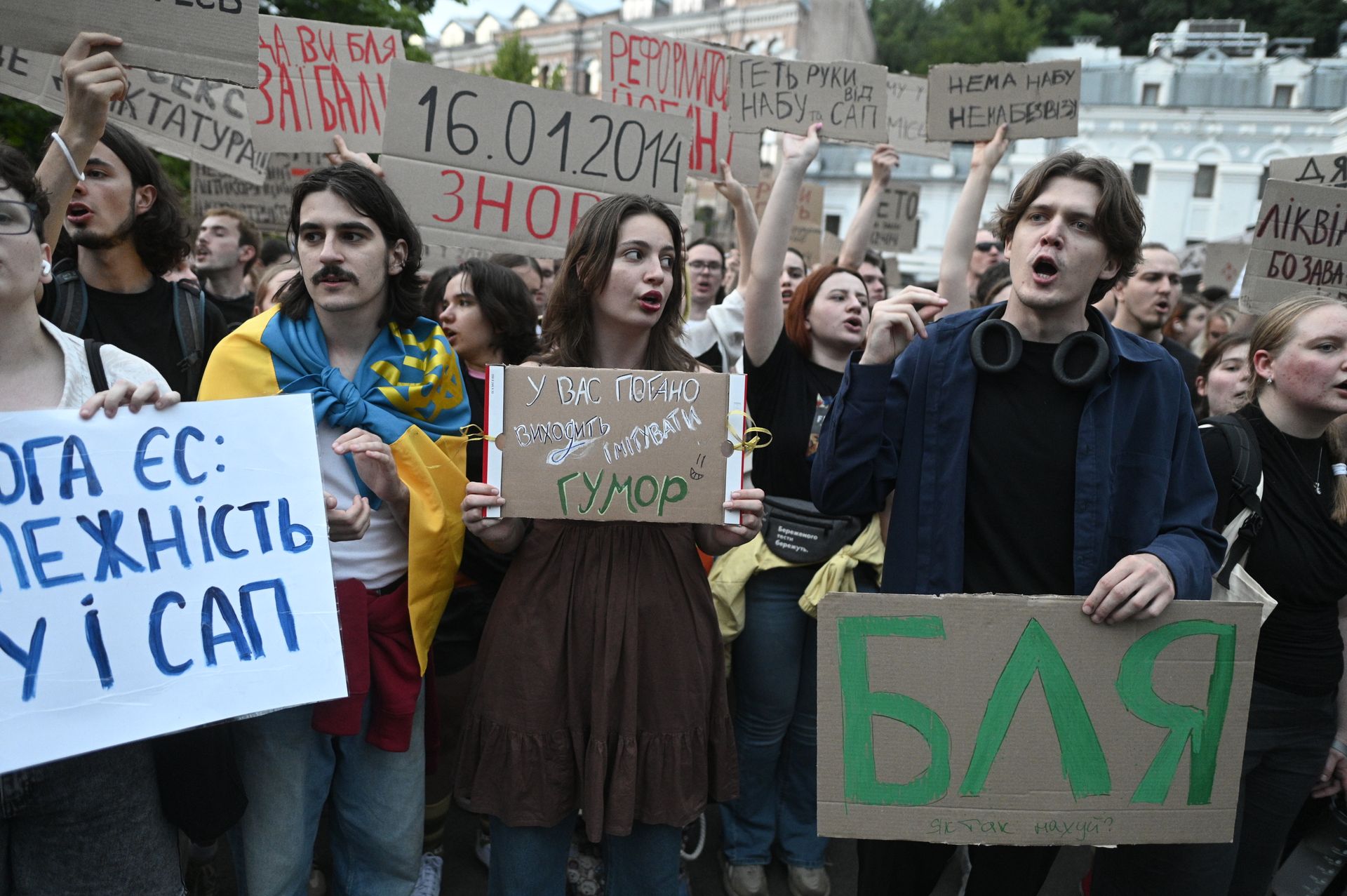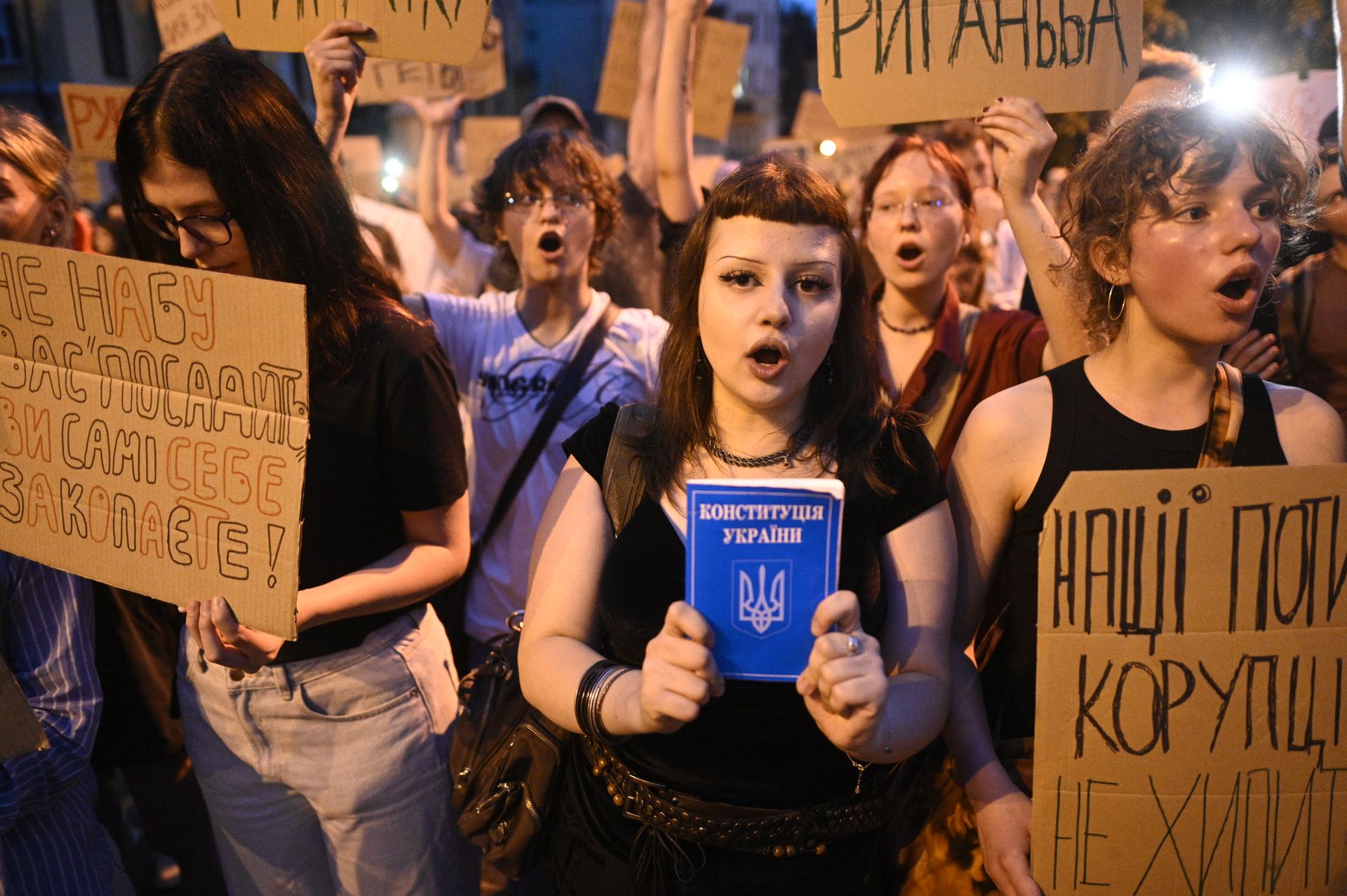Zelensky dismantles Ukraine's anti-corruption infrastructure, brings law enforcement agencies under his thumb

President Volodymyr Zelensky walks past the European Union flag in Vilnius, Lithuania, on July 12, 2023. (Sean Gallup / Getty Images)
Ukraine faced a watershed moment on July 22 as parliament passed, and the president signed, a bill that effectively eliminates the independence of the country's anti-corruption institutions.
The bill will subordinate the National Anti-Corruption Bureau (NABU) and the Special Anti-Corruption Prosecutor's Office (SAPO) to the prosecutor general. Activists and opposition lawmakers say that this will make it impossible for the anti-corruption agencies to investigate top incumbent officials without approval from President Volodymyr Zelensky's administration.
"In effect, the anti-corruption infrastructure was dismantled by the votes of 263 members of parliament," NABU Chief Semen Kryvonos said at a joint briefing with Chief Anti-Corruption Prosecutor Oleksandr Klymenko attended by the Kyiv Independent.
"The two independent institutions, NABU and SAPO, are effectively being made fully dependent."

Anti-corruption activists say that the legislation will block Ukraine's European integration since the functioning of independent anti-corruption institutions has been a key condition for the country's accession to the European Union.
For some critics, the bill's importance is comparable to former pro-Russian President Viktor Yanukovych's 2013 decision to reverse Ukraine's European integration, which triggered the EuroMaidan Revolution, which led to the president's ousting.
The passage of the bill followed sweeping searches by law enforcement agencies at the NABU and SAPO premises on July 21. The moves also come amid a criminal case against Vitaly Shabunin, one of Ukraine's top anti-corruption activists, and an attempt by the authorities to pass a bill to grant amnesty for corruption in the defense industry.
Lawmakers, experts, and activists say that over the past week, Ukraine has made a leap towards authoritarianism and lawlessness.
The President's Office and the parliament speaker have declined to comment.
What are NABU and SAPO?
Both the National Anti-Corruption Bureau (NABU) and the Special Anti-Corruption Prosecutor's Office were created in 2015 as part of pro-Western reforms following Ukraine's 2014 EuroMaidan Revolution, which ousted Yanukovych and his corrupt regime.
The NABU investigates top-level corruption, and its cases are overseen and prosecuted by the Special Anti-Corruption Prosecutor's Office. They are subsequently tried by the High Anti-Corruption Court.
The purpose of the reforms was to create independent anti-corruption agencies capable of investigating and prosecuting top officials suspected of graft. Old law enforcement agencies, which were politically subservient and mired in corruption, were seen as unable to fulfill this task.

The idea was that, without political interference, the National Anti-Corruption Bureau and the Special Anti-Corruption Prosecutor's Office would be free to go after powerful incumbents.
Since their creation, the administrations of President Petro Poroshenko and his successor Zelensky have attempted many times to limit the anti-corruption agencies' independence.
This time, it appears that the incumbent president succeeded in dismantling the independence of those institutions.
Clauses of the bill
Previously, the bureau and Special Anti-Corruption Prosecutor's Office were procedurally independent from the prosecutor general.
Anti-corruption cases were supervised by the chief anti-corruption prosecutor, who was independent from the prosecutor general.
The bill eliminates this independence and subordinates the NABU and SAPO to the prosecutor general.
Specifically, the prosecutor general would directly supervise anti-corruption prosecutors.
Previously the prosecutor general did not have the authority to take away cases falling within the NABU's jurisdiction from the bureau. The new bill enables the prosecutor general to do so.
Even before the bill was passed, prosecutor generals had interfered in the bureau's cases, but it was difficult for them to do so, and they often had to resort to illegal means, Olena Shcherban, an expert at the Anti-Corruption Action Center, told the Kyiv Independent.
Specifically, she referred to the bribery case against Zelensky's Deputy Chief of Staff Oleh Tatarov.
In 2020, the Prosecutor General's Office used a court ruling to take the Tatarov case away from the NABU, and subsequently it was obstructed by prosecutors and closed.
Now, the bill would give the prosecutor general legal authority to interfere in the work of the NABU and SAPO and take any case away from them if he sees fit, Shcherban added.
The heads of NABU and SAPO were selected by independent commissions free of the president's influence. The prosecutor general is a political figure in Ukraine, nominated by the president and approved by the parliament controlled by the president's party.
Procedural violations
The bill was rushed through parliament. The amendments that subjugate anti-corruption agencies were added to an older bill that previously passed the first reading and had little to do with the topic.
Less than 24 hours passed between the introduction of the amendments and the vote, followed by Speaker Ruslan Stefanchuk and later the president signing the bill into law — an unprecedented pace.

Activists and opposition lawmakers say the draft law was passed with procedural violations. Specifically, lawmakers did not receive the text of the bill on time, according to Shcherban.
"What happened today in the parliamentary hall was shocking," Inna Sovsun, a lawmaker from the Holos party, told the Kyiv Independent. "The draft law was pushed through despite clear procedural violations... lawmakers from the Servant of the People party applauded. It felt like a coven."
Anastasia Radina, head of parliament's anti-corruption committee from the Servant of the People party, also said that the bill was passed with grave procedural violations.
"The table (with amendments) that lawmakers could see, comparing what exactly was added, appeared fifteen minutes before the vote in the hall," she said.
Even some of those who voted for the bill did so somewhat in the dark.
"Honestly, for me, it came as a shock. I was not informed. I was not in the loop before it happened," a lawmaker from Zelensky's Servant of the People party who voted for the bill and spoke on condition of anonymity told the Kyiv Independent.
"But I just hope the president knows what he's doing. And I trust him on that."
NABU's reaction
Following the parliamentary vote, NABU Chief Kryvonos urged Zelensky to veto the bill, a plea that remained unanswered.
Kryvonos described the legislation as effectively signaling the "destruction of the independence" of the two anti-corruption institutions by exposing them to political influence and pressure on both ongoing and future investigations.
"What was created in response to society's demands and those of the EuroMaidan Revolution... was destroyed today by lawmakers, including former members of (Yanukovych's) Party of Regions and individuals who are under investigation by the NABU and SAPO," he said.
Kryvonos also said that the President's Office had not reached out to him to discuss the bill.
If Zelensky signs the bill, Kryvonos said they will work with Western partners to restore the anti-corruption agencies' independence.
Kryvonos also said that criminal probes against himself or Klymenko were possible in the future.
Destruction of anti-corruption infrastructure
Critics of the bill argue that it is a death blow to Ukraine's anti-corruption agencies.
A source at the NABU told the Kyiv Independent he is considering quitting after the passage of the bill because he does not know "how to be effective in these conditions."
"To be honest, we might as well hang a padlock on NABU," the source said. "I have no doubt about (Prosecutor General Ruslan) Kravchenko's political loyalty and bias. Now, no investigation that affects those in power will move forward, and he'll shut down the old ones. The entire essence of the 2014 anti-corruption reform is going down the drain."
Prosecutor General Kravchenko told journalists on July 22 that he won't interfere in the bureau's work and that he believes the bureau will remain independent.
"Why don't you trust me?" he asked journalists several times.
Vitaly Shabunin, head of the Anti-Corruption Action Center, said on Facebook that, after the passage of the bill, "the existence of the NABU, SAPO and the High Anti-Corruption Court doesn't make any sense."
"Zelensky's prosecutor general will stop investigations against all the president's friends," he added.
He continued that electronic asset declarations for officials, punishment for illicit enrichment, confiscation of ill-gotten gains, and all other anti-corruption reforms would become equally meaningless without independent anti-corruption agencies.
Commenting on the elimination of Ukraine's anti-corruption infrastructure, Radina said that "the building is not just on fire, it's burned to embers already."
Yaroslav Yurchyshyn, a lawmaker from the Holos party, said that the bill "will finally destroy the independence of the anti-corruption infrastructure."
"The prosecutor general, a man 100% loyal to the president, will decide who and what cases will be investigated, who and how will provide procedural support from the prosecutor's office," he told the Kyiv Independent. "Therefore, we should expect the closure of a number of high-profile cases, such as the Chernyshov case."

Yurchyshyn was referring to former Deputy Prime Minister Oleksiy Chernyshov, who was charged with bribery and abuse of power in June.
Responding to a question by the Kyiv Independent, Kravchenko said that he won't be transferring the Chernyshov case from the NABU.
Security Service Head Vasyl Malyuk said at the same briefing that Kravchenko, appointed a month ago, will be helping the NABU with advice.
European integration at risk
The destruction of Ukraine's anti-corruption infrastructure is also a major blow to its aspirations to join the EU, whose conditions for the country's accession include progress on anti-corruption reforms.
"The European Union is concerned about Ukraine's recent actions with regard to its anti-corruption institutions, NABU and SAPO," Guillaume Mercier, a spokesperson for the European Commission, said on July 22. "These institutions are crucial to Ukraine's reform agenda and must operate independently to fight corruption and maintain public trust."
He added that "Ukraine's EU accession will require a strong capacity to combat corruption and to ensure institutional resilience."
Marta Kos, the European commissioner for enlargement, also said on July 22 that she was "seriously concerned over today's vote in the parliament."
"The dismantling of key safeguards protecting NABU's independence is a serious step back," she added. "Independent bodies like NABU and SAPO are essential for Ukraine's EU path. The rule of law remains in the very center of EU accession negotiations."
Shcherban told the Kyiv Independent that the bill will make Ukraine's further European integration impossible.
Radina also said that "(the NABU and SAPO's) work and independence and track record meet the obligations of Ukraine in accordance with the IMF memoranda, the documents related to European integration, the action plan of visa liberalization with the European Union and so on."
"All these documents that I have just mentioned are violated by today's decision of the Verkhovna Rada, unfortunately," she added. "It's a terrible shame."
Sovsun told the Kyiv Independent that the bill is "a fundamental shift that strikes at the heart of democracy."
"It's something the EU can't afford to ignore, and it will impact how Ukraine is perceived, including our prospects for integration," she said.
A top European diplomat, speaking on condition of anonymity, told the Kyiv Independent that the independence of the NABU is a key benchmark and that EU institutions are closely monitoring the situation.
Back to Yanukovych era
For some opponents of the legislation, the bill is reminiscent of the lawlessness and authoritarianism characteristic of ex-President Yanukovych's era.
Yury Nikolov, an investigative journalist focusing on corruption, told the Kyiv Independent that "we've gone back to the times of Yanukovych, which I always considered the peak of corruption in Ukraine."

Shabunin wrote on Facebook that the bill "allows Zelensky to dismantle the key anti-corruption achievements of the (EuroMaidan Revolution) and takes us back to the Yanukovych era — at least in terms of justice."
"I'm addressing the members of parliament who are going to vote for this. Remember what Ukrainians did to the Party of Regions," he added in a reference to Yanukovych's party, whose power collapsed due to the 2014 EuroMaidan Revolution. "The Ukrainians are much angrier now than they were back then."
Ukrainian historian Yaroslav Hrytsak even described the bill as a "coup d'etat — not in terms of a government change but in terms of the principles on which a government should operate."
"A sound state cherishes the independence of its institutions — this one curtails it," he said. "This government is sick, and it reveals its sickness at the most critical moment of the war. It is dangerous, it is depressing, it is suicidal."
Why is it happening now?
Activists and lawmakers say that the crackdown on Ukraine's anti-corruption agencies is the government's backlash against high-profile cases that recently targeted Zelensky's inner circle.
These include the bribery and abuse of power case against Chernyshov, as well as an embezzlement case against a relative of Timur Mindich, a film producer and co-owner of Zelensky's Kvartal 95 production company.
"(If the NABU loses its independence), there will only remain anti-corruption investigations against low-level people," Nikolov told the Kyiv Independent. "Top corrupt officials will be able to get away with anything."
Another major factor is Donald Trump's election as U.S. president in 2024.
In contrast to the administration of former President Joe Biden, Trump's team has paid little attention to anti-corruption reforms in Ukraine and has not made any statements on the issue. Trump has frozen funding for the U.S. Agency for International Development (USAID), which had financed rule of law reforms and civil-society watchdogs in Ukraine.
Ukrainian authorities have seen this as a clear signal to act.















